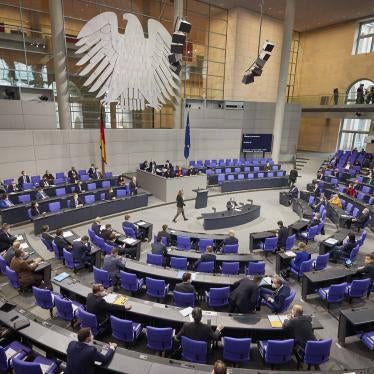(New York) - The Thai government should immediately revoke the designation of neighborhood areas as "live fire zones" that might be used to justify the unnecessary and unlawful use of lethal force, Human Rights Watch said today.
On May 14, 2010, the government's Center for the Resolution of the Emergency Situation (CRES) set out three rules governing when army troops and police may use live ammunition: as warning shots to deter demonstrators from moving in closer; for self-defense; and when forces have "[a] clear visual of terrorists." The third rule is on its face contrary to international rules governing the use of lethal force during policing operations.
"By setting out these ‘live fire zones', the Thai authorities are on a slippery slope towards serious abuses," said Brad Adams, Asia director at Human Rights Watch. "It's a small step for soldiers to think ‘live fire zone' means ‘free fire zone', especially as violence escalates. These are city neighborhoods, and the government should remember that ordinary people live there, not only protesters."
In a CRES statement placed on the Thai government website from a press conference held on May 14, CRES spokesperson Col. Sanserd Kaewkamnerd is quoted as saying that having "clear visual of terrorists" permits government authorities to fire live ammunition at protesters. There is no guidance for security forces to determine whether a person is a "terrorist," raising serious concerns about countenancing use of lethal force beyond United Nations rules, which require that a person must pose an imminent danger to others' lives in order to use such force.
Human Rights Watch said that in protecting public safety, Thai authorities are obligated to use lawful means, including force proportionate to the level of threat or legitimate objective. The United Nations Basic Principles on the Use of Force and Firearms by Law Enforcement Officials provide that all security forces shall, as far as possible, apply nonviolent means before resorting to the use of force and firearms. Whenever the lawful use of force and firearms is unavoidable, the authorities must use restraint and act in proportion to the seriousness of the offense. Lethal force may only be used when strictly unavoidable to protect life. The Basic Principles also call for an effective reporting and review process, especially in cases of death and serious injury.
"The Thai government needs to be absolutely clear about its rules on using force and ensuring that soldiers and police on the streets strictly follow those rules," said Adams. "The army and government should show they will hold to account anyone in the security forces or administration responsible for serious abuses."
Human Rights Watch reiterated its call for all sides to show restraint, and urged both the United Front for Democracy Against Dictatorship (UDD), known as the "red shirts," and the government to immediately resume negotiations for a peaceful political resolution to the crisis.
"No one benefits when Bangkok's diplomatic quarter and up-scale tourism areas become shooting zones," said Adams. "This is the moment when both sides need to step back, de-escalate the violence, and negotiate in good faith for a political solution."





